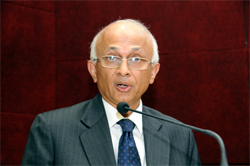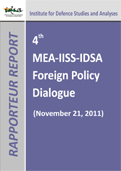Rapporteur Report: Fourth MEA-IISS-IDSA Foreign Policy Dialogue (November 21, 2011)
A joint initiative of the Public Diplomacy Division of the Ministry of External Affairs and the International Institute of Strategic Studies, this series of Foreign Policy Dialogue began in London in February 2007. On this occasion, the issues discussed were: ‘Growing Asian Economies: Challenges and Opportunities’, ‘Terrorism and Transnational Security Challenges in South Asia’, and ‘UK-India Partnership in a Global Perspective’. The second Dialogue was held in Delhi in December 2007 and covered themes such as ‘Global Developments’, ‘International Terrorism’ and ‘Energy Security’. London was once again the venue for the third dialogue in this series, which was held in February 2010 and focused on ‘Countering Terrorism and Extremism’, ‘Nuclear Non-Proliferation and Disarmament’ and ‘Climate Change and Security’. This year, the MEA and the IISS collaborated with the Institute for Defence Studies and Analyses (IDSA) for the fourth dialogue of the series held in New Delhi. The Dialogue was inaugurated by Foreign Secretary Ranjan Mathai who delivered a Keynote Address on the theme ‘Towards Stability in Asia’.
Foreign Secretary Ranjan Mathai’s Keynote Address
 Foreign Secretary Ranjan Mathai examined the future and the importance of forging a new stability in Asia. The vast expanse of Asia, he noted, required a look at whether Asia can be considered as a single strategic entity. He touched on the themes of the three sessions scheduled for the day. Asymmetric war is ‘actually war by other means’ and state-sponsored terrorism is a form of asymmetric warfare. In particular, the danger of nuclear weapons falling into the hands of terrorists needs attention. Terrorism, he noted, is a serious source of instability across regions in Asia. Concerted international efforts must continue to counter terrorism and become the norm in policy-making.
Foreign Secretary Ranjan Mathai examined the future and the importance of forging a new stability in Asia. The vast expanse of Asia, he noted, required a look at whether Asia can be considered as a single strategic entity. He touched on the themes of the three sessions scheduled for the day. Asymmetric war is ‘actually war by other means’ and state-sponsored terrorism is a form of asymmetric warfare. In particular, the danger of nuclear weapons falling into the hands of terrorists needs attention. Terrorism, he noted, is a serious source of instability across regions in Asia. Concerted international efforts must continue to counter terrorism and become the norm in policy-making.
With regard to stability in the AfPak region, an architecture built on the concept of economic cooperation in a region stretching from Turkey to South Asia and Central Asia to the Gulf passing through Afghanistan, metaphorically called the ‘Silk Route’, could be useful today to lock in the kind of common interests that can foster Asian stability. This also includes maritime routes which are quite natural to Asia and must be made part of the Asian architecture. Such a ‘Silk Route’ would not only be economically beneficial but also act as a confidence-building measure. Better relations with Pakistan and other countries of South Asia could leap-frog the SAARC region into a high-growth trajectory. The rise of a new democratic West Asia will bring its own set of challenges and opportunities and India among other nations will have a role to play.
As far as China is concerned, India-China relations are both competitive and complementary. There is a need for continued engagement with China across all spectrums despite outstanding problems on the border issue. A trilateral dialogue between India, China and the US could be a major factor of stability in Asia. In conclusion, he dwelt on the concept of an ‘Inclusive Asia’ as the basis for a new Asian identity and stability. Economic cooperation in the region will provide the best prospect for working on an architecture of stability in Asia.
Click here for complete text of address
Session 1: Asymmetric Warfare and International Security
Session 2: Towards stability in Pakistan and Afghanistan
Session 3: Engaging China
Report compiled by Keerthi Sampath Kumar, Anshuman Behera, Rajorshi Roy and Shamshad Khan of IDSA.




